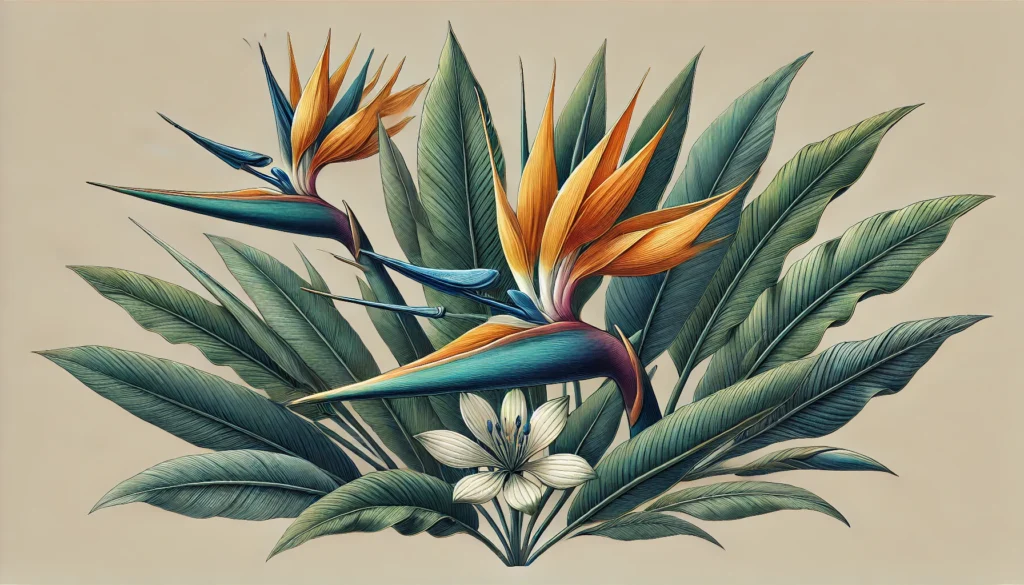

Home » Cat Plants » Can the Bird of Paradise Flower be Harmful to Cats?

The Bird of Paradise flower (Strelitzia reginae) is indeed toxic to cats. This exotic plant, known for its striking orange and blue blooms resembling a bird’s head, contains compounds that can cause mild to moderate poisoning in felines if ingested. The toxicity primarily stems from the plant’s gastrointestinal irritants, which are present in all parts of the plant, including the leaves, stems, and flowers.
Bird of Paradise plants are commonly found in tropical and subtropical gardens, as well as indoor houseplants in cooler climates.
Ingestion may cause mild gastrointestinal upset, but is generally not life-threatening.
Ingestion can result in mild symptoms like vomiting, diarrhea, or drooling. Rarely fatal but may require veterinary care.
Eating these plants can lead to more pronounced symptoms like abdominal pain, lethargy, or difficulty breathing. Veterinary intervention may be necessary.
Ingesting even small amounts can cause severe symptoms like organ damage, seizures, or cardiac failure without rapid treatment.
All parts of these plants are extremely poisonous to cats and can quickly lead to death, even with immediate veterinary care.
** Please note: Please note that toxicity level can vary based on the amount ingested and the specific cat. It's always best to keep these plants completely inaccessible to cats and seek immediate veterinary care or call the poison hotline if you suspect your cat has ingested any part of a toxic plant.
If your cat ingests any part of the Bird of Paradise plant, they may experience a range of symptoms due to its toxic properties. It’s crucial to be aware of these signs to ensure prompt veterinary care if needed.Common symptoms of Bird of Paradise poisoning in cats include:
In some cases, cats may also experience skin irritation if they come into contact with the plant’s sap.
If you suspect your cat has ingested Bird of Paradise, a veterinarian will likely follow these steps for diagnosis:

A: Yes, the Bird of Paradise Flower plant is harmful to cats if ingested. It contains toxins that can cause digestive issues and, in more severe cases, affect a cat’s nervous system.
A: If a cat eats the Bird of Paradise Flower, symptoms such as vomiting, nausea, and drooling are common. In some cases, it may also experience dizziness or disorientation.
A: The Bird of Paradise Flower is moderately toxic to pets, particularly cats and dogs. While not usually life-threatening, ingestion can lead to discomfort and requires veterinary attention.
A: If your cat ingests the Bird of Paradise Flower, contact your veterinarian as soon as possible. Prompt treatment can help alleviate symptoms and prevent further complications.
A: Yes, several non-toxic plants like the spider plant or Boston fern are safer alternatives to the Bird of Paradise Flower. These plants are beautiful and pose no threat to your cat’s health.
A: To prevent your cat from eating harmful plants like the Bird of Paradise Flower, keep such plants out of your home or place them in inaccessible areas. Offering your cat safe alternatives like cat grass can also help deter them from toxic plants.
The Bird of Paradise flower, scientifically known as Strelitzia reginae, is native to South Africa. It was first introduced to Europe in 1773 when it was brought to the Royal Botanic Gardens at Kew. The plant’s genus, Strelitzia, was named in honor of Queen Charlotte, wife of King George III and Duchess of Mecklenburg-Strelitz. Its species name, reginae, means “of the queen” in Latin.
Known for its striking appearance, the Bird of Paradise quickly gained popularity as an ornamental plant. It became a symbol of paradise and freedom due to its exotic nature and resemblance to a tropical bird in flight. Today, it is widely cultivated in tropical and subtropical regions worldwide and is the official flower of Los Angeles, California.
Please note: The information shared in this post is for informational purposes only and should not be considered as veterinary medical advice.
🐾 A hilarious or heart-melting cat video
🐾 Our latest paws-on review of a cool cat toy